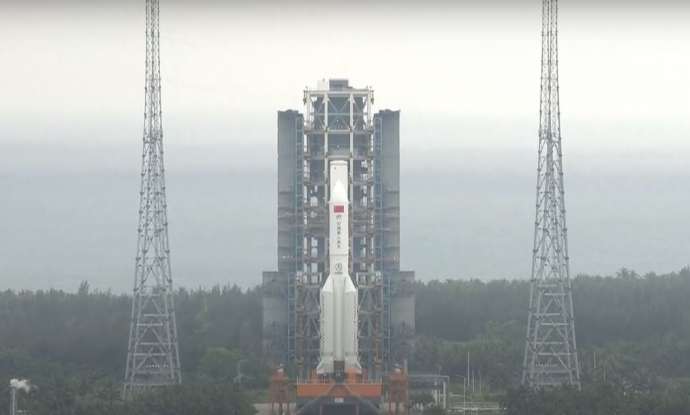Časoris is an online newspaper aimed at children. Each week we’ll take an article and post it here as a Slovene-English dual text.
Odpadni del rakete je v nedeljo padel na Zemljo
The debris of a rocket fell to Earth on Sunday
Written by Dora Adamič, translated by JL Flanner & G Translate
Pri vzletu kitajske rakete 29. aprila letos je šlo nekaj narobe.
Something went wrong with the take-off of a Chinese rocket on April 29 this year.
Del rakete je ob vzletu odpadel prehitro in začel padati na Zemljo.
Part of the rocket fell off too quickly on take-off and began to fall to Earth.
Ko raketa vzleti v vesolje, med poletom skozi atmosfero običajno sicer odvrže nekaj svojih delov. Tako zaradi nižje mase pri pospeševanju porabi manj goriva.
When a rocket takes off into space, it usually sheds some of its parts during its flight through the atmosphere. Because of the lower mass, it uses less fuel when accelerating.
Deli, ki odpadejo na začetku, navadno padejo na Zemljo na določenem kontroliranem območju, kjer ne predstavljajo nevarnosti.
Parts that fall off at the beginning usually fall to Earth in a certain controlled area where they do not pose a danger.
Tisti, ki odpadejo dovolj visoko, pa ostanejo v orbiti in ne padejo na Zemljo.
Those that fall high enough, however, remain in orbit and do not fall to Earth.
Zaradi napake je del kitajske rakete ostal preblizu Zemlje in pričel padati nazaj. Ta del je bil težek kar 21 ton in je letel s hitrostjo približno 28 tisoč kilometrov na uro.
Due to the error, part of the Chinese rocket remained too close to Earth and began to fall back. This part weighed as much as 21 tons and flew at a speed of about 28 thousand kilometres per hour.
Pri tako veliki hitrosti so raziskovalci težko napovedali točno lokacijo padca nazaj na Zemljo.
At such a high speed, it was difficult for researchers to predict the exact location of the fall back to Earth
»Napovedovali smo, da se bo padec zgodil nekje okoli ekvatorja, najbolj severno kvečjemu do Rima ali do južnih obal Črne gore,« pravi prof. dr. Tomaž Zwitter s fakultete za matematiko in fiziko.
"We predicted that the fall would happen somewhere around the equator, at most to the north to Rome or to the southern coast of Montenegro," says Prof. Dr. Tomaž Zwitter from the Faculty of Mathematics and Physics.
Odpadni del rakete je padel v Indijski ocean zahodno od Maldivov v nedeljo, 9. maja, ob 3.24 uri po našem času.
The debris of the rocket fell into the Indian Ocean west of the Maldives on Sunday, May 9, at 3.24pm local time.
Nekontrolirani padci masivnih teles se ne dogajajo pogosto.
Uncontrolled falls of massive bodies do not happen often.
»Po pravilih je treba telo pred vstopom v atmosfero z eksplozivnim nabojem razbiti v več manjših kosov, ki potem vsi brez težav zgorijo in zato nič ne pade na tla,« pravi Zwitter.
“According to the rules, before entering the atmosphere the body must be broken into several smaller pieces with an explosive charge, which then all burn without difficulty and therefore nothing falls to the ground,” says Zwitter.
Tomaž Zwitter je že pred padcem odpadnih delov rakete menil, da ti ne predstavljajo večje nevarnosti.
Even before the fall of the debris of the rocket, Tomaž Zwitter believed that they did not pose a major danger.
»Hoditi po pločniku ob cesti je mnogo bolj nevarno, saj se vsak dan po svetu zgodi veliko nesreč. Torej brez skrbi in le pogumno naprej!«
“Walking on the sidewalk along the road is much more dangerous, as many accidents happen around the world every day. So no worries and just bravely go on! ”
Read more stories and improve your Slovene at Časoris, while all our dual texts can be found here.







